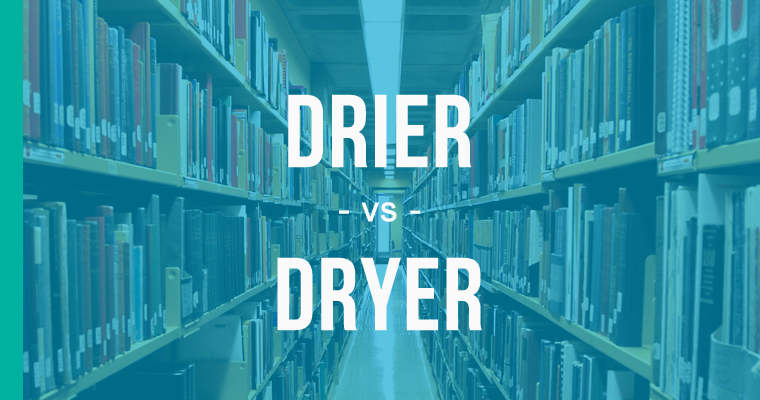Drier or Dryer – How to Use Each Correctly

What’s the Difference Between Drier and Dryer?
Contents
In the past, it was common for people to use these two words completely interchangeably. However, over time the usage of each spelling diverged from the other. Nowadays, standard English makes a strong distinction between each of these words.
Drier is the comparative form of the adjective dry.
- Deserts have a much drier climate than rainforests.
Dryer is a noun for a machine that removes water from something such as clothes or hair.
- After she got out of the shower, the woman turned on her hair dryer to blow dry her hair.
By understanding them each in context you can better understand the differences of each form. Now, let’s go over a few ways you can use these words in your sentences.
Using Drier in a Sentence
When to use drier: Drier is a comparative adjective that means more dry, or in other words, with less water.
For example:
- The soil is a little drier today than it was yesterday, but still not dry enough to plant these seeds.
- Her illness is easier to treat in drier weather. You might consider moving to a location with less rain, if you want her to recover more quickly.
Despite the fact that this spelling removes the y, the pronunciation still has a y sound between the i and the er. That makes drier and dryer homophones.
Using Dryer in a Sentence
When to use dryer: A dryer is a machine that dries something. The two most common appliances to do this include a hair dryer and a clothes dryer.
For example,
- My washing machine is broken, but at least the dryer still works.
- The boy got his father a boot warmer and dryer for his birthday. Now whenever it rains, the father won’t have to worry about getting his boots wet.
Most dryers remove moisture through heat, the use of a centrifuge, moving air, or some combination of those.
Remembering Drier vs. Dryer
You might be wondering why there are two spellings for these words. You may also wonder why it was once acceptable to use either spelling and now it’s not.
To answer the first question, in the past it was much more common for one word to have many variations in spelling. This is because there were not yet standardized rules for spelling.
To answer the second question, anytime a language has two words (or two spellings) with the exact same meaning and connotation, one of two things will occur. The first possibility is that one of those variations will win out, and the other will disappear. The other possibility is that the two variations will diverge in meaning and connotation. That second possibility is what happened with drier and dryer.
To remember this difference, you can think of the common collocation for dryer. Usually people say washer and dryer together, as in I need to buy a new washer and dryer. Just as a dryer is a thing that dries, a washer is a thing that washes. For both of these words that go together, just add er.
Also, think of the common antonym for drier: wetter. Just as the adjective wet must add an extra letter (a t) to become comparative, dry must change the y to an i.
Outside Examples
- “The [relative] humidities right now along the coast are much drier than what you’d normally see in the interior desert in the summertime,” Swain said. –LA Times
- Think of this grape as a riesling’s austere cousin – perfumed and spicy, but much drier that its German pal. –OC Register
- During the seven-day trial, Bourmeche recounted being forced into an industrial clothes dryer by his drill instructor. –New York Daily News
- A 15% discount on a $1,000 washer-and-dryer set means a $150 refund. –USA Today
Quiz: Drier vs. Dryer
Instructions: Fill in the blank with the correct word, either drier or dryer.
- Am I allowed to put sneakers in the washer or the ______________, or will that mess them up?
- I should never have gone on that roller coaster through the waterfall. My clothes are still soaked and they show no signs of getting any _________ anytime soon.
- This summer is a lot ___________ than last year’s. I’m worried that it could increase the chance of wildfires.
See answers below.
Article Summary
Should I use drier or dryer? Although these words are homonyms, and both relate to the word dry, they have separate meanings. You cannot mix them up.
- Dryer is a noun for a machine or apparatus that makes things less wet.
- Drier is a comparative adjective that means more dry.
Don’t let the similarities confuse you when choosing which word to use.
Answers from Quiz
- dryer
- drier
- drier
